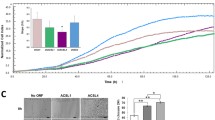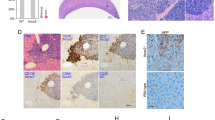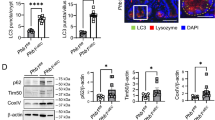Abstract
Acyl-CoA synthetase 5 (ACSL5), a mitochondrially localized enzyme, catalyzes the synthesis of long-chain fatty acid thioesters and is physiologically involved in pro-apoptotic sensing of enterocytes. The aim of the present study is to identify an ACSL5-dependent regulation of mitochondrially expressed proteins and the characterization of related pathways in normal and diseased human intestinal mucosa. Proteomics of isolated mitochondria from ACSL5 transfectants and CaCo2 controls were performed. ACSL5-dependent protein synthesis was verified with quantitative reverse transcription plus the polymerase chain reaction, Western blotting, short-interfering-RNA-mediated gene silencing and additional cell culture experiments. Lipid changes were analyzed with tandem mass spectrometry. ACSL5-related pathways were characterized in normal mucosa and sporadic adenocarcinomas of the human intestine. In CaCo2 cells transfected with ACSL5, mortalin (HSPA9) was about two-fold increased in mitochondria, whereas cytoplasmic mortalin levels were unchanged. Disturbance of acyl-CoA/sphingolipid metabolism, induced by ACSL5 over-expression, was characterized as crucial. ACSL5-related over-expression of mitochondrial mortalin was found in HEK293 and Lovo (wild-type TP53 [tumor protein p53]) and CaCo2 (p53-negative; TP53 mutated) cells but not in Colo320DM cells (mutated TP53). In normal human intestinal mucosa, an increasing gradient of both ACSL5 and mortalin from bottom to top was observed, whereas p53 (wild-type TP53) decreased. In sporadic intestinal adenocarcinomas with strong p53 immunostaining (mutated TP53), ACSL5-related mortalin expression was heterogeneous. ACSL5-induced mitochondrial mortalin expression is assumed to be a stress response to ACSL5-related changes in lipid metabolism and is regulated by the TP53 status. Uncoupling of ACSL5 and mitochondrial mortalin by mutated TP53 could be important in colorectal carcinogenesis.




Similar content being viewed by others
References
Brown SL, Riehl TE, Walker MR, Geske MJ, Doherty JM, Stenson WF, Stappenbeck TS (2007) Myd88-dependent positioning of Ptgs2-expressing stromal cells maintains colonic epithelial proliferation during injury. J Clin Invest 117:258–269
Bu SY, Mashek DG (2010) Hepatic long-chain acyl-CoA synthetase 5 mediates fatty acid channeling between anabolic and catabolic pathways. J Lipid Res 51:3270–3280
Chomczynski P (1993) A reagent for the single-step simultaneous isolation of RNA, DNA and proteins from cell and tissue samples. Biotechniques 15:532–537
Coleman RA, Lewin TM, Van Horn CG, Gonzalez-Baro MR (2002) Do long-chain acyl-CoA synthetases regulate fatty acid entry into synthetic versus degradative pathways? J Nutr 132:2123–2126
Czarnecka AM, Campanella C, Zummo G, Cappello F (2006) Mitochondrial chaperones in cancer: from molecular biology to clinical diagnostics. Cancer Biol Ther 5:714–720
Deocaris CC, Kaul SC, Wadhwa R (2006) On the brotherhood of the mitochondrial chaperones mortalin and heat shock protein 60. Cell Stress Chaperones 11:116–128
Digel M, Ehehalt R, Stremmel W, Füllekrug J (2009) Acyl-CoA synthetases: fatty acid uptake and metabolic channeling. Mol Cell Biochem 326:23–28
Drozdowski LA, Clandinin T, Thomson AB (2010) Ontogeny, growth and development of the small intestine: understanding pediatric gastroenterology. World J Gastroenterol 16:787–799
Dundas SR, Lawrie LC, Rooney PH, Murray GI (2005) Mortalin is over-expressed by colorectal adenocarcinomas and correlates with poor survival. J Pathol 205:74–81
Ellis JM, Frahm JL, Li LO, Coleman RA (2010) Acyl-coenzyme A synthetases in metabolic control. Curr Opin Lipidol 21:212–217
Faergeman NJ, Knudsen J (1997) Role of long-chain fatty acyl-CoA esters in the regulation of metabolism and in cell signalling. Biochem J 323:1–12
Fink L, Seeger W, Ermert L, Hänze J, Stahl U, Grimminger F, Kummer W, Bohle RM (1998) Real-time quantitative RT-PCR after laser-assisted cell picking. Nat Med 4:1329–1333
Gassler N, Kopitz J, Tehrani A, Ottenwälder B, Schnölzer M, Kartenbeck J, Lyer S, Autschbach F, Poustka A, Otto HF, Mollenhauer J (2004) Expression of acyl-CoA synthetase 5 reflects the state of villus architecture in human small intestine. J Pathol 202:188–196
Gassler N, Herr I, Schneider A, Penzel R, Langbein L, Schirmacher P, Kopitz J (2005) Impaired expression of acyl-CoA synthetase 5 in sporadic colorectal adenocarcinomas. J Pathol 207:295–300
Gassler N, Newrzella D, Böhm C, Lyer S, Li L, Sorgenfrei O, Laer L van, Sido B, Mollenhauer J, Poustka A, Schirmacher P, Gretz N (2006) Molecular characterisation of non-absorptive and absorptive enterocytes in human small intestine. Gut 55:1084–1089
Gassler N, Roth W, Funke B, Schneider A, Herzog F, Tischendorf JJ, Grund K, Penzel R, Bravo IG, Mariadason J, Ehemann V, Sykora J, Haas TL, Walczak H, Ganten T, Zentgraf H, Erb P, Alonso A, Autschbach F, Schirmacher P, Knüchel R, Kopitz J (2007) Regulation of enterocyte apoptosis by acyl-CoA synthetase 5 splicing. Gastroenterology 133:587–598
Gestl EE, Anne Böttger S (2012) Cytoplasmic sequestration of the tumor suppressor p53 by a heat shock protein 70 family member, mortalin, in human colorectal adenocarcinoma cell lines. Biochem Biophys Res Commun 423:411–416
Görg A, Boguth G, Obermaier C, Posch A, Weiss W (1995) Two-dimensional polyacrylamide gel electrophoresis with immobilized pH gradients in the first dimension (IPG-Dalt): the state of the art and the controversy of vertical versus horizontal systems. Electrophoresis 16:1079–1086
Gottlieb E, Vousden KH (2010) p53 regulation of metabolic pathways. Cold Spring Harb Perspect Biol 2:a001040
Gudkov AV, Komarova EA (2010) Pathologies associated with the p53 response. Cold Spring Harb Perspect Biol 2:a001180
Haynes CA, Allegood JC, Sims K, Wang EW, Sullards MC, Merrill AH Jr (2008) Quantitation of fatty acyl-coenzyme As in mammalian cells by liquid chromatography-electrospray ionization tandem mass spectrometry. J Lipid Res 49:1113–1125
Iosefson O, Azem A (2010) Reconstitution of the mitochondrial Hsp70 (mortalin)-p53 interaction using purified proteins—identification of additional interacting regions. FEBS Lett 584:1080–1084
Jump DB (2008) N-3 polyunsaturated fatty acid regulation of hepatic gene transcription. Curr Opin Lipidol 19:242–247
Kaul SC, Aida S, Yaguchi T, Kaur K, Wadhwa R (2005) Activation of wild type p53 function by its mortalin-binding, cytoplasmically localizing carboxyl terminus peptides. J Biol Chem 280:39373–39379
Kaul SC, Deocaris CC, Wadhwa R (2007) Three faces of mortalin: a housekeeper, guardian and killer. Exp Gerontol 42:263–274
Knudsen J, Neergaard TB, Gaigg B, Jensen MV, Hansen JK (2000) Role of acyl-CoA binding protein in acyl-CoA metabolism and acyl-CoA-mediated cell signaling. J Nutr 130:294S–298S
Kroemer G, Marino G, Levine B (2010) Autophagy and the integrated stress response. Mol Cell 40:280–293
Lewin TM, Kim JH, Granger DA, Vance JE, Coleman RA (2001) Acyl-CoA synthetase isoforms 1, 4, and 5 are present in different subcellular membranes in rat liver and can be inhibited independently. J Biol Chem 276:24674–24679
Li LO, Klett EL, Coleman RA (2010) Acyl-CoA synthesis, lipid metabolism and lipotoxicity. Biochim Biophys Acta 1801:246–251
Liu Y, Bodmer WF (2006) Analysis of p53 mutations and their expression in 56 colorectal cancer cell lines. Proc Natl Acad Sci U S A 103:976–981
Lu WJ, Lee NP, Kaul SC, Lan F, Poon RT, Wadhwa R, Luk JM (2011) Mortalin-p53 interaction in cancer cells is stress dependent and constitutes a selective target for cancer therapy. Cell Death Differ 18:1046–1056
Luo WI, Dizin E, Yoon T, Cowan JA (2010) Kinetic and structural characterization of human mortalin. Prot Exp Purific 72:75–81
Marcus K, Immler D, Sternberger J, Meyer HE (2000) Identification of platelet proteins separated by two-dimensional gel electrophoresis and analyzed by matrix assisted laser desorption/ionization-time of flight-mass spectrometry and detection of tyrosine-phosphorylated proteins. Electrophoresis 21:2622–2636
Mashima T, Oh-hara T, Sato S, Mochizuki M, Sugimoto Y, Yamazaki K, Hamada J, Tada M, Moriuchi T, Ishikawa Y, Kato Y, Tomoda H, Yamori T, Tsuruo T (2005) p53-defective tumors with a functional apoptosome-mediated pathway: a new therapeutic target. J Natl Cancer Inst 97:765–777
Mashima T, Sato S, Okabe S, Miyata S, Matsuura M, Sugimoto Y, Tsuruo T, Seimiya H (2009) Acyl-CoA synthetase as a cancer survival factor: its inhibition enhances the efficacy of etoposide. Cancer Sci 100:1556–1562
Naccarati A, Polakova V, Pardini B, Vodickova L, Hemminki K, Kumar R, Vodicka P (2012) Mutations and polymorphisms in TP53 gene—an overview on the role in colorectal cancer. Mutagenesis 27:211–218
Pinto D, Gregorieff A, Begthel H, Clevers H (2003) Canonical Wnt signals are essential for homeostasis of the intestinal epithelium. Genes Dev 17:1709–1713
Ray RM, Bhattacharya S, Johnson LR (2011) Mdm2 inhibition induces apoptosis in p53 deficient human colon cancer cells by activating p73- and E2F1-mediated expression of PUMA and Siva-1. Apoptosis 16:35–44
Reinartz A, Ehling J, Leue A, Liedtke C, Schneider U, Kopitz J, Weiss T, Hellerbrand C, Weiskirchen R, Knüchel R, Gassler N (2010) Lipid-induced up-regulation of human acyl-CoA synthetase 5 promotes hepatocellular apoptosis. Biochim Biophys Acta 1801:1025–1035
Remmele W, Stegner HE (1987) Recommendation for uniform definition of an immunoreactive score (IRS) for immunohistochemical estrogen receptor detection (ER-ICA) in breast cancer tissue. Pathologe 8:138–140
Rozenberg P, Kocsis J, Saar M, Prohászka Z, Füst G, Fishelson Z (2013) Elevated levels of mitochondrial mortalin and cytosolic HSP70 in blood as risk factors in patients with colorectal cancer. Int J Cancer 133:514–518
Russo A, Bazan V, Iacopetta B, Kerr D, Soussi T, Gebbia N (2005) The TP53 colorectal cancer international collaborative study on the prognostic and predictive significance of p53 mutation: influence of tumor site, type of mutation, and adjuvant treatment. J Clin Oncol 23:7518–7528
Ruvolo PP (2003) Intracellular signal transduction pathways activated by ceramide audits metabolites. Pharmacol Res 47:383–392
Sääf AM, Halbleib JM, Chen X, Yuen ST, Leung SY, Nelson WJ, Brown PO (2007) Parallels between global transcriptional programs of polarizing Caco-2 intestinal epithelial cells in vitro and gene expression programs in normal colon and colon cancer. Mol Biol Cell 18:4245–4260
Sampath H, Ntambi JM (2005) Polyunsaturated fatty acid regulation of genes of lipid metabolism. Annu Rev Nutr 25:317–340
Saxena N, Katiyar SP, Liu Y, Grover A, Gao R, Sundar D, Kaul SC, Wadhwa R (2013) Molecular interactions of Bcl-2 and Bcl-xL with mortalin: identification and functional characterization. Biosci Rep 33:e00073
Schotte P, Criekinge W van, Van de Craen M, Loo G van, Desmedt M, Grooten J, Cornelissen M, De Ridder L, Vandekerckhove J, Fiers W, Vandenabeele P, Beyaert R (1998) Cathepsin B-mediated activation of the proinflammatory caspase-11. Biochem Biophys Res Commun 251:379–387
Shaner RL, Allegood JC, Park H, Wang E, Kelly S, Haynes CA, Sullards MC, Merrill AH Jr (2009) Quantitative analysis of sphingolipids for lipidomics using triple quadrupole and quadrupole linear ion trap mass spectrometers. J Lipid Res 50:1692–1707
Soupene E, Kuypers FA (2008) Mammalian long-chain acyl-CoA synthetases. Exp Biol Med 233:507–521
Tong F, Black PN, Coleman RA, DiRusso CC (2006) Fatty acid transport by vectorial acylation in mammals: roles played by different isoforms of rat long-chain acyl-CoA synthetases. Arch Biochem Biophys 447:46–52
Unger RH, Clark GO, Scherer PE, Orci L (2010) Lipid homeostasis, lipotoxicity and the metabolic syndrome. Biochim Biophys Acta 1801:209–214
Van den Brink GR, Bleuming SA, Hardwick JC, Schepman BL, Offerhaus GJ, Keller JJ, Nielsen C, Gaffield W, Deventer SJ van, Roberts DJ, Peppelenbosch MP (2004) Indian hedgehog is an antagonist of Wnt signaling in colonic epithelial cell differentiation. Nat Genet 36:277–282
Van Es JH, Gijn ME van, Riccio O, Born M van den, Vooijs M, Begthel H, Cozijnsen M, Robine S, Winton DJ, Radtke F, Clevers H (2005) Notch/gamma-secretase inhibition turns proliferative cells in intestinal crypts and adenomas into goblet cells. Nature 435:959–963
Wadhwa R, Taira K, Kaul SC (2002) An Hsp70 family chaperone, mortalin/ mthsp70/PBP74/Grp75: what, when, and where? Cell Stress Chaperones 7:309–316
Wanders RJ, Ferdinandusse S, Brites P, Kemp S (2010) Peroxisomes, lipid metabolism and lipotoxicity. Biochim Biophys Acta 1801:272–280
Yi X, Luk JM, Lee NP, Peng J, Leng X, Guan XY, Lau GK, Beretta L, Fan ST (2008) Association of mortalin (HSPA9) with liver cancer metastasis and prediction for early tumor recurrence. Mol Cell Proteomics 7:315–325
Acknowledgments
The authors are grateful to P. Akens for typing and proof-reading the manuscript. The great help of Dr. C. Henkel and S. Fiedler in preparation of protein gels and MALDI mass spectrometry and of D. Weisner in preparation of qRT-PCRs is highly appreciated.
Author information
Authors and Affiliations
Corresponding author
Additional information
Christina Klaus and Elke Kaemmerer contributed equally to this work.
None of the authors has any conflicts of interest.
This work was partially supported by the Deutsche Forschungsgemeinschaft (DFG GA 785/5-1) and Deutsche Krebshilfe (GA 109313).
Rights and permissions
About this article
Cite this article
Klaus, C., Kaemmerer, E., Reinartz, A. et al. TP53 status regulates ACSL5-induced expression of mitochondrial mortalin in enterocytes and colorectal adenocarcinomas. Cell Tissue Res 357, 267–278 (2014). https://doi.org/10.1007/s00441-014-1826-8
Received:
Accepted:
Published:
Issue Date:
DOI: https://doi.org/10.1007/s00441-014-1826-8




